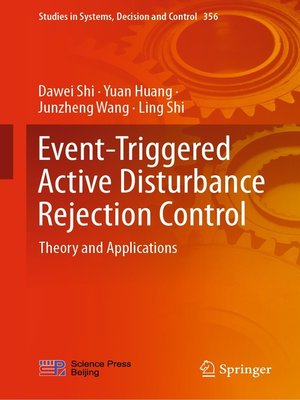Event-Triggered Active Disturbance Rejection Control
ebook ∣ Theory and Applications · Studies in Systems, Decision and Control
By Dawei Shi

Sign up to save your library
With an OverDrive account, you can save your favorite libraries for at-a-glance information about availability. Find out more about OverDrive accounts.
Find this title in Libby, the library reading app by OverDrive.



Search for a digital library with this title
Title found at these libraries:
| Library Name | Distance |
|---|---|
| Loading... |
The past few years have seen the attention and rapid developments in event-triggered sampled-data systems, in which the effect of event-triggered sensor measurements and controller updates is explored in controller analysis and design.
This book offers the first systematic treatment of event-triggered sampled-data control system design using active disturbance rejection control (ADRC), an effective approach that is popular in both theoretic research and industrial applications. Extensive application examples with numerous illustrations are included to show how the event-triggered ADRC with theoretic performance guarantees can be implemented in engineering systems and how the performance can be actually achieved. For theoretic researchers and graduate students, the presented results provide new directions in theoretic research on event-triggered sampled-data systems; for control practitioners, the book offers an effective approach to achieving satisfactory performance with limited sampling rates.
This book offers the first systematic treatment of event-triggered sampled-data control system design using active disturbance rejection control (ADRC), an effective approach that is popular in both theoretic research and industrial applications. Extensive application examples with numerous illustrations are included to show how the event-triggered ADRC with theoretic performance guarantees can be implemented in engineering systems and how the performance can be actually achieved. For theoretic researchers and graduate students, the presented results provide new directions in theoretic research on event-triggered sampled-data systems; for control practitioners, the book offers an effective approach to achieving satisfactory performance with limited sampling rates.







